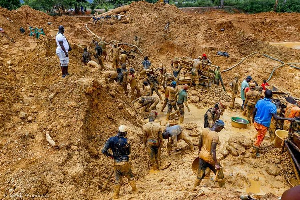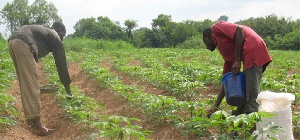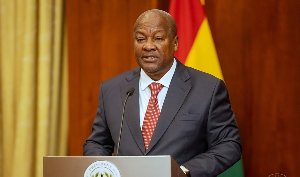Ghana’s illegal mining crisis, commonly known as "galamsey," continues to devastate the country's environment, particularly its forests and water bodies.
Despite bold promises and high-level interventions, the fight against galamsey under the Nana Addo-led New Patriotic Party (NPP) government has proven ineffective. Worse still, the involvement of government officials, party members, and influential people within the ruling administration has contributed to the persistence of this environmental and economic crisis.
The only way to halt this menace is by voting out the current NPP government, and a vote for Dr. Mahamudu Bawumia will only reinforce the ongoing degradation.
Nana Addo's Failed Pledge to Fight Galamsey
In 2017, President Nana Addo Dankwa Akufo-Addo famously declared that he had placed his presidency on the line to stop galamsey. This strong rhetoric was supposed to signal his administration’s unwavering commitment to ending illegal mining. To demonstrate seriousness, the government established an inter-ministerial committee to tackle the issue, and security contingents, including the military and police, were deployed to assist in enforcing the law.
However, despite these measures, galamsey is still rampant across the country. Water bodies like the Pra, Ankobra, and Offin Rivers are polluted beyond recognition, and Ghana’s once-thriving forests are rapidly being depleted.
The government's failure to curb this environmental catastrophe is not just an issue of inefficiency; it is a reflection of deep-rooted corruption and underhand dealing within the ranks of the ruling party.
A Flawed and Politicized Security Structure
The anti-galamsey initiative has been heavily reliant on security councils such as the Regional Security Council (REGSEC) and District Security Council (DISEC), which are tasked with managing security issues, including illegal mining. These councils are chaired by political appointees, such as regional ministers and district chief executives, who are themselves affiliated with the ruling NPP.
Their membership includes officers from the police, military, customs, and intelligence agencies, supposedly ensuring a holistic approach to fighting crime. Yet, these same institutions have failed to bring an end to galamsey.
One of the key reasons for this failure is the involvement of party officials and government appointees in illegal mining activities.
According to Prof. Kwabena Frimpong-Boateng, former chairman of the Inter-Ministerial Committee on Illegal Mining (IMCIM), “many party officials from the national to the unit committee level had their friends, PAs, agents, relatives, financiers, or relatives engaged in illegal mining.” His revelations are shocking and confirm the suspicions that powerful forces within the NPP are benefiting from galamsey, either directly or indirectly.
How can a government be expected to solve a problem when its own members are complicit in perpetuating it?
Party Officials and Galamsey: A Deep-Seated Conflict of Interest
The real issue behind the NPP government's inability to fight galamsey is that those who should be leading the fight are instead profiting from the crime. Prof. Frimpong-Boateng further alleged that appointees in the Jubilee House and relations of the president at the seat of government, are involved in illegal mining or are interfering with efforts to combat the menace.
Such claims demonstrate a dangerous conflict of interest and corruption, where the very people mandated to protect Ghana's natural resources are instead enabling their destruction.
Moreover, the involvement of Chinese nationals in illegal mining operations, often facilitated by local party actors, adds an international dimension to the crisis. The exportation of Ghana’s gold by foreign miners, with the backing of local influencers, not only devastates the environment but also drains valuable resources from the nation’s economy.
Prof. Frimpong-Boateng’s damning accusations that an NPP Member of Parliament in the Ashanti Region was selling illegally acquired concessions for personal profit illustrate the rot within the system. When government officials are profiting from galamsey, it is clear that the NPP under the leadership of President Nana Addo and Dr Bawumia is not truly committed to stopping it.
What makes the situation even more troubling is that many of the regions hardest hit by galamsey activities are strongholds of the New Patriotic Party (NPP), with sitting Members of Parliament (MPs) who wield significant influence. The presence of these MPs, along with local government officials tied to the ruling party, raises serious concerns about the government's commitment to combating this destructive practice.
1. Ashanti Region: A Hotbed of Galamsey Activity
The Ashanti Region, the traditional stronghold of the NPP, has some of the most widespread illegal mining activities in the country. Areas like Obuasi, Amansie Central, and Bekwai are plagued by galamsey, with water bodies like the Offin and Oda Rivers heavily polluted.
• Obuasi: Known for its rich gold deposits, Obuasi is also home to rampant illegal mining. The area has faced challenges in addressing the galamsey problem, despite the government's purported efforts to crack down on illegal mining.
• Amansie Central: This district has been ravaged by illegal mining, particularly in towns like Jacobu and Adubia. These areas are also represented by NPP MPs who have struggled to curb the galamsey menace, despite the region's importance to the party.
• Bekwai: Another mining area within the Ashanti Region, Bekwai has seen widespread environmental destruction due to galamsey making it difficult for local authorities to tackle illegal miners linked to political figures.
The Ashanti Region is not only a stronghold of the NPP but also home to some of the wealthiest and most powerful individuals in the party like the Ashanti regional chairman. Allegations of illegal mining activities involving these influential figures, as exposed by Prof. Frimpong-Boateng, raise serious concerns about the government's willingness to stop galamsey when party members are implicated.
2. Eastern Region: Ground Zero for Galamsey
The Eastern Region, another key NPP stronghold, is ground zero for illegal mining in Ghana. Towns like Kyebi, Atiwa, and Akim Oda are heavily affected by galamsey, leading to the destruction of forest reserves and contamination of rivers like the Birim.
• Kyebi: The hometown of President Nana Addo Dankwa Akufo-Addo, Kyebi has become a symbol of the galamsey menace. Despite the president’s pledge to stop illegal mining, Kyebi remains a hotspot for galamsey.
• Atiwa: This district is home to the Atiwa Forest, one of Ghana’s most significant ecological sites. Despite its environmental importance, illegal mining continues unabated and authorities have not been able to control the situation, even though these areas are crucial for the party’s electoral success.
• Akim Oda: Another major area affected by illegal mining in the Eastern Region, Akim Oda has seen severe environmental degradation. Authorities have faced immense pressure to deal with the issue, but his efforts have been overshadowed by the political dynamics at play.
The Eastern Region’s status as an NPP bastion complicates the fight against galamsey, as local party figures often have vested interests in the mining sector. With party officials and MPs deeply entrenched in these areas, it is no surprise that efforts to stop illegal mining have failed.
3. Western Region: A Strategic but Endangered Stronghold
The Western Region, rich in mineral resources, has become another area where galamsey is rampant. Districts like Tarkwa-Nsuaem, Prestea-Huni Valley, and Wassa Amenfi are particularly affected.
• Tarkwa-Nsuaem: Known for its long history of gold mining, Tarkwa has been overrun by illegal miners. Authorities have come under fire for the perceived lack of action in combating galamsey. The area’s economic reliance on mining makes the situation even more complicated, with local miners often protected by political figures.
• Prestea-Huni Valley: This constituency has seen an escalation of illegal mining activities. The destruction of rivers and forests in this region is a direct result of unchecked galamsey operations, which continue despite government interventions.
• Wassa Amenfi: With its vast mineral resources, Wassa Amenfi has become a target for illegal miners. NPP MPs for the area face difficulties in stopping the destruction of natural resources, with party members accused of either engaging in or supporting illegal mining.
The Western Region is a strategic stronghold for the NPP due to its mineral wealth, but the rampant galamsey in the area puts both the environment and the party’s credibility at risk.
4. Central Region: Galamsey in Cape Coast and Beyond
The Central Region is another area deeply affected by galamsey, particularly in districts like Upper Denkyira and Cape Coast.
• Upper Denkyira: This district has been severely affected by illegal mining, with rivers and forests suffering from pollution and deforestation.
• Cape Coast: Even though Cape Coast is more urbanized, illegal mining operations in nearby areas have resulted in environmental degradation. The region’s MPs face immense pressure from local communities to address the situation, but little has changed.
The galamsey crisis in Ghana has been exacerbated by the deep entanglement of the New Patriotic Party (NPP) in illegal mining activities, particularly in its strongholds like the Ashanti, Eastern, and Western Regions.
High-profile figures, including NPP Women’s Organiser Kate Gyamfua, whose excavators were destroyed by a task force, and Ashanti Regional Chairman Bernard Antwi-Boasiako (Chairman Wontumi), whose Akonta Mining Company was caught engaging in galamsey despite a ban, highlight the party’s involvement.
Meanwhile, Speaker of Parliament Alban Bagbin warned MPs against accepting money from illegal miners for campaign funds, and Asantehene Otumfuo Osei Tutu II has taken action by destooling chiefs involved in galamsey, though the government has yet to arrest or prosecute them.
As Prof. Kwabena Frimpong-Boateng revealed, many NPP officials at all levels are implicated in galamsey, using their political influence to avoid accountability.
This pervasive corruption explains why the government’s efforts to stop illegal mining have failed, despite President Akufo-Addo’s pledge to put his presidency on the line. The ongoing crisis makes clear that the NPP’s leadership is unable or unwilling to truly combat galamsey, and Ghanaians must demand change by rejecting the party’s approach to this issue.
Environmental and Economic Disaster
Ghana is at a critical juncture. The ongoing galamsey activities are wreaking havoc on the country's environment. Rivers that were once a source of drinking water for many communities have turned brown with toxic chemicals, while acres of forest land have been ravaged. These environmental consequences have a direct impact on public health and Ghana’s ability to sustain its agricultural sector, especially for cocoa production.
The economic consequences are equally dire. Illegal mining operations siphon millions of dollars from the country, money that could be invested in public services like healthcare, education, and infrastructure. Instead, it ends up in the pockets of a few individuals, both in Ghana and abroad, while the majority of Ghanaians suffer from the fallout of environmental degradation and economic instability.
Why Voting Out the NPP is the Only Solution
The evidence is clear: the NPP government has failed to stop galamsey because it has been compromised at the highest levels. A vote for Dr. Mahamudu Bawumia, the current Vice President and NPP presidential candidate, would only reinforce the status quo.
Dr. Bawumia has been an integral part of the current administration, which has presided over the worsening galamsey situation. His election would mean more of the same – continued environmental destruction, economic exploitation, and a deepening of the current crisis.
Voting out the NPP government is the only way to send a clear message that Ghanaians will no longer tolerate the looting of their natural resources by a privileged few. A new government with fresh leadership and a genuine commitment to fighting illegal mining is the only path forward for the country.
Conclusion
The continued prevalence of galamsey in NPP strongholds highlights a troubling conflict of interest within the ruling party. With sitting MPs and party officials deeply involved in illegal mining, it is clear that the NPP lacks the political will to end the crisis. A vote for Dr. Mahamudu Bawumia in the upcoming elections would only reinforce the status quo, perpetuating the environmental degradation and economic losses caused by galamsey.
To truly protect Ghana’s forests, water bodies, and future, Ghanaians must vote out the NPP. Only with new leadership untainted by the interests of illegal miners can the country hope to end the galamsey menace and restore its natural resources.
Opinions of Monday, 9 September 2024
Columnist: Korsi Dzokoto















